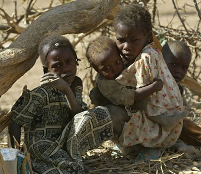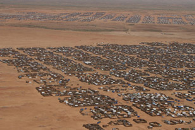
In Rod Lurie’s first political potboiler, Deterrence, a U.S. president audaciously entered a nuclear confrontation with a newly aggressive (and surprisingly well-armed) Saddam Hussein. While hardly an original concept in 2000, the year of the film’s release, Deterrence offered a crucial kick: The president making these threats was Jewish, and therefore his every decision was perceived (fairly or not) through the prism of his religion and his assumed loyalty to Israel. Indeed, as the time for button-pushing neared, even his closest advisors began to wonder how many Americans their guy was willing to sacrifice in order to protect the Holy Land.
The above paragraph could easily launch a discussion of the bizarre spectacle staged yesterday by controversial National Intelligence Council nominee Charles Freeman, who blamed the apparently nefarious “Israel lobby” for forcing him to withdraw from consideration. The influence of AIPAC, and the third-rail effect of giving too much weight to Arab concerns when discussing Israel’s security, are fascinating topics — but they’re not the ones I’m interested in today. (Feel free to discuss them in the comments section.)
 Instead, I’m interested in another ethnic president — and the possibility that his very ethnicity may have some impact, positive or negative, on our desire or ability to finally get something done in Darfur.
Instead, I’m interested in another ethnic president — and the possibility that his very ethnicity may have some impact, positive or negative, on our desire or ability to finally get something done in Darfur.
This has been another momentous week in the planet’s longest-running human disaster. Last Wednesday, the International Criminal Court issued an arrest warrant for Sudanese president Omar Hassan al-Bashir, and Bashir responded by expelling all international aid groups and NGOs from Darfur. The Obama administration’s initial response was, in a word, pathetic: a State Department spokesman noted that throwing out the NGOs “is certainly not helpful to the people who need aid.” You think?
A follow-up response at the United Nations was a bit more vigorous, but the fact remains that, less than three weeks before the onset of the region’s rainy season, nearly 2 million Darfuris stand to lose their access to adequate shelter, health services and/or potable water. Nicholas Kristof of the New York Times, who has been shouting valiantly into the wind on this subject for six years now, warned this week that by cutting off the food, medicines and water-extraction assistance that has helped them survive in Darfur’s massive refugee camps, Bashir is once again committed to killing Darfuris en masse. Susan Rice, Obama’s U.N. ambassador, called the move “genocide by other means.”
Darfur, of course, is one more foreign-policy catastrophe that Obama has inherited from the previous administration. There’s no question that Darfur has always been a complex problem, strategically speaking — the Western allies’ dismay over the fate of the region balanced against China’s refusal to brook punishment of its Sudanese oil-trading partners. Still, the fact is that more could have been done on the Darfuris’ behalf all these years, and China’s obstinacy could have been overcome, had Americans and Europeans considered Darfur to be in our nations’ strategic interests.
 We haven’t. Darfur’s oppressed minority, just like Rwanda’s Hutus and Sierra Leone’s rural populace before them, have been forced to suffer genocidal atrocities primarily because Western nations chose not to commit precious military resources to their defense. Apart from various Cold War-era covert ops and our brief and lamentable efforts in Somalia during the early ’90s, Africa has never been given more than lip service as a vital security concern. Now, as Obama faces yet another indefensible fiat from Sudan’s brutal government, it’s time for him to decide anew whether or not African lives matter as much as those on other continents.
We haven’t. Darfur’s oppressed minority, just like Rwanda’s Hutus and Sierra Leone’s rural populace before them, have been forced to suffer genocidal atrocities primarily because Western nations chose not to commit precious military resources to their defense. Apart from various Cold War-era covert ops and our brief and lamentable efforts in Somalia during the early ’90s, Africa has never been given more than lip service as a vital security concern. Now, as Obama faces yet another indefensible fiat from Sudan’s brutal government, it’s time for him to decide anew whether or not African lives matter as much as those on other continents.
Obama may be our first African-American president — as Bobby Jindal will be happy to remind you in condescending fashion — but he has toed a very fine line over the past two years, trying not to overemphasize his heritage while exploiting the advantages it has given him with certain parts of the electorate. Now that he’s governing, there’s certainly a chance that Obama’s very presence in the White House — and the opportunity it seems to have provided for a rethinking of race at home and abroad — will galvanize American and international focus on African affairs.
Yet Obama inevitably faces the prospect that some of his actions will be portrayed by political opponents (fairly or not) as too narrowly benefiting blacks in the U.S. or overseas. Is it possible that such worries will hamstring him as he considers what priority to place on Darfur?
 They shouldn’t; indeed, they mustn’t. This rainy spring (and the dusty summer that follows it) may be make-or-break time for those millions of refugees; if Bashir is able to cut off their last remaining means of survival, the numbers of Darfuris killed by starvation or epidemic by the end of this year may outpace those murdered during six years of violence. If ever there was a time to light a fire under American policy, that time is now.
They shouldn’t; indeed, they mustn’t. This rainy spring (and the dusty summer that follows it) may be make-or-break time for those millions of refugees; if Bashir is able to cut off their last remaining means of survival, the numbers of Darfuris killed by starvation or epidemic by the end of this year may outpace those murdered during six years of violence. If ever there was a time to light a fire under American policy, that time is now.
It won’t be easy, of course. The Chinese have been supplying the Sudanese government with arms, equipment and training for years, while their refusal to abide by international sanctions has provided a huge market for Sudan’s oil and allowed Bashir’s government to remain viable. Meanwhile, our military has been stretched practically to the breaking point, and our ability to focus international opinion and spur multilateral action is only beginning to recover from eight years of George Bush. The continuing wars in Iraq and Afghanistan, along with never-ending diplomatic quandaries elsewhere in the Middle East and Asia, make it difficult to imagine taking on yet another major engagement elsewhere. Not to mention the fact that all our economies are in the toilet…
However, that last fact also provides opportunity. The collapse of oil prices over the last eight months has weakened the Sudanese considerably, while China’s economic troubles (and attendant drop in demand for oil) make their partnership with Sudan less crucial than it has been. This may be an excellent time to convince China to accelerate its creeping movement toward the international community’s rejection of the Bashir government, at which point Sudan’s isolation will be practically complete.
 Obama’s campaign co-chair, retired Air Force Gen. Merrill McPeak, has suggested that we implement a no-fly zone over Darfur to deny Sudanese troops air cover for their atrocities and provide access for a return of aid groups. Other recent suggestions have included forcing Bashir to turn over administration of the Darfur region to South Sudan, which maintains its own government; however, Bashir has stated his intention to attack the south, so that plan might not offer much sustained relief.
Obama’s campaign co-chair, retired Air Force Gen. Merrill McPeak, has suggested that we implement a no-fly zone over Darfur to deny Sudanese troops air cover for their atrocities and provide access for a return of aid groups. Other recent suggestions have included forcing Bashir to turn over administration of the Darfur region to South Sudan, which maintains its own government; however, Bashir has stated his intention to attack the south, so that plan might not offer much sustained relief.
Short of an all-out ground attack on Khartoum, which likely couldn’t gain support in any Western nation at this point, the best options remain a multinational (but not merely African-based) peacekeeping force to keep Sudanese troops out of Darfur, or a no-fly regime of air patrols with additional clearance to attack Sudanese ground forces heading toward the region. Chinese acquiescence, if not outright support, will be required to make either of those options viable; now is the time to begin negotiations in earnest, to get the Chinese off their recalcitrance and get moving on a solution to a crisis we should have solved years ago.
One more thing: If we’re ever successful — with success, in the best case, looking something like the outcome in Kosovo a decade ago, followed by the fall of Bashir’s government much like that of Slobodan Milosevic in Serbia — the U.S. will need to end its own obstinacy, toward the International Criminal Court. Otherwise, we’ll have no ability to participate (or, really, to have any moral standing whatsoever) in Bashir’s prosecution.
Obama must, finally, reject the notion that our participation can only be predicated on some form of blanket immunity for American troops or officials. Common-sense protection from frivolous accusations, yes — but those are already built into the court’s governing documents. American wrongdoing on the international stage deserves no special status — no matter what the consequences for certain high-level members of certain former administrations.




Comments